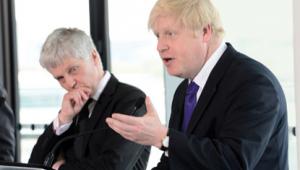By Richard Johnstone in Manchester | 1 October 2013
Mayor of London Boris Johnson has called for Chancellor George Osborne to lift the ‘baleful effects’ of stamp duty on the capital by localising control over property taxes.
In his speech to the Conservative party conference today, Johnson said the Greater London Authority’s plan to build 400,000 new homes over ten years would allow the city to deal with its expanding population.
However, he said there was a need to do more, including allowing companies to make tax-free loans for rental deposits.
He added: ‘And George, I hope I am not exceeding my brief if I urge you to look at the baleful effects of stamp duty in London, which is stamping on the fingers of those who are trying to climb the property ladder.'
Stamp duty is one of the property taxes that Johnson, alongside the eight core cities in England outside London, said yesterday should be devolved to town halls.
For the first time, the Mayor of London, London Councils and the Core Cities Group – representing Birmingham, Bristol, Leeds, Liverpool, Manchester, Newcastle, Nottingham and Sheffield – have jointly called for greater financial freedoms. The bodies said business rates should also be fully devolved and fewer constraints should placed on council tax increases
The authorities said devolution of property taxes would mirror recent changes in Scotland, where stamp duty and landfill taxes were devolved to Holyrood.
Localised revenues would provide stable and continuous funding to stimulate economic growth, moving away from financing for specific projects to allow cities to make ‘sustained investment’ in transport, schools, housing, energy supply and technology.
The call follows the London Finance Commission’s report, published in May, which recommended the capital be given full control over property taxes.
Launching the campaign at the Conservative party conference, Johnson said the cross-party effort was ‘an historic and significant move’. Reform would be good for the whole country, not just cities.
'My aim is for the capital to win fiscal reforms in line with those presented by Professor Tony Travers’ excellent London Finance Commission report, namely those that give residents and businesses a closer say over where their hard-earned taxes are spent’ he said.
‘This will enable politicians elected by Londoners to plan and finance the infrastructure we need to prosper in the face of a decade of expansion. By the same token, this formula can be applied to cities across England, ending stop-start finance settlements and instead providing a reliable stream of funding to enable investment, jobs and growth.’
Sir Richard Leese, chair of the Core Cities cabinet and Labour leader of Manchester City Council, said both the Core Cities and London could increase growth if they were not hampered by ‘an almost complete lack of control’ over finances.
‘England’s great cities have a proud tradition of independence and ambition. Yet our ability to act on that ambition has been eroded as central state control of our finances has increased year on year,’ said Leese.
‘Together the Core Cities and London represent more than half of the national economy and almost half the population. But we only directly control around 5% of the taxes raised within our cities, and such funds as are returned by the government come back with strings attached. This means less local decision-making, missed opportunities, wasted time and money and less competitive cities.’






















